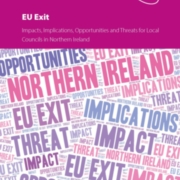Exit from the EU: Opportunities and Threats for Local Councils in Northern Ireland
A new APSE Actions Paper, written in close collaboration with NILGA, sets out the challenges and opportunities for Northern Ireland councils in the wake of the UK’s exit from the EU.
The research has sought to identify the direct impacts, implications, opportunities and threats of the United Kingdom’s exit from the European Union upon local government policies and resources in Northern Ireland, with a specific emphasis on the areas of local council business most affected.
Speaking of the Paper, APSE Chief Executive Paul O’Brien said, “As the political upheaval of the last five years will attest, tensions run remarkably high when it comes to the merits of the UK’s withdrawal from the EU. It was for this reason APSE and NILGA were keen to look at EU exit in terms of strategic impact and outcomes. The result is this comprehensive Actions Paper.
“The Paper identifies that although serious challenges to the prosperity of Northern Ireland councils exist – amongst them the removal of EU structural Funds from 2022 and the risk of multinational companies relocating – there may also exist greater opportunities for councils to enhance social value once outside of EU procurement rules. As well as holding many lessons for our member councils in Northern Ireland, this Paper also provides a rich source of information for councils in England, Scotland and Wales.”
The Actions Paper is designed to be practical in its nature through identifying the broad array of areas of council business, whereby EU Exit is having/likely to have an impact; before exploring a smaller number of these in more depth and their implications, opportunities and threats, and identifying actions which local councils will need to take in response in the medium to long term. It does not seek to provide an opinion one way or the other on the merits of the EU Exit but is intended to inform local councils about current and emerging issues.
Derek McCallan, Chief Executive of NILGA, said, “Whilst there is clearly the potential for variations in cross-border working, and a need to re-think both economic and tourism development, it is clear from this action Paper that local councils in Northern Ireland are already identifying alternative funding sources for growing their economy; including those which support both tourism and trade. This Paper acknowledges that there is a real opportunity for local councils to develop and enhance their unique place-based offering. However, our research finds that the speed of decision making, and current macro planning processes, may hinder progress.
“This report is the start of a conversation, requiring evidence-based advocacy, and not an end itself. Nevertheless, we hope that it provides a practical toolkit to start those conversations within, and between, local councils and their partners; ensuring local councils can maximise social value, shaping how business is done, and what outcomes can be nurtured to the benefit of local people.”
This Actions Paper presents the core findings of several roundtable discussions with officers and members from Northern Ireland’s 11 local councils between January and June 2021. Conversations were also held with representatives of Manufacturing NI, the Northern Ireland Chamber of Commerce and Invest NI.
Download our report for free here
Notes to editor
- This Actions Paper presents the core findings of research work undertaken by Matthew Baqueriza-Jackson between January and June 2021, in collaboration with the Association for Public Service Excellence (APSE) and the Northern Ireland Local Government Association (NILGA).
- APSE is the Association for Public Service, a not-for-profit organisation working with over 300 councils throughout the UK providing advice, support and research on frontline local government services. Contact Mo Baines, Head of Communication and Coordination [email protected] mobile 07971 84515 to arrange for interview or further information or Matt Ellis, APSE Communications Officer on [email protected] tel: 0161 772 1810.
- The Northern Ireland Local Government Association (NILGA) is the council led representative body for local authorities in Northern Ireland. The Association is supported by political parties and independent members in councils, and works in partnership with other key regional bodies and stakeholders. NILGA members are drawn from each of the 11 councils.


.png)



.png)